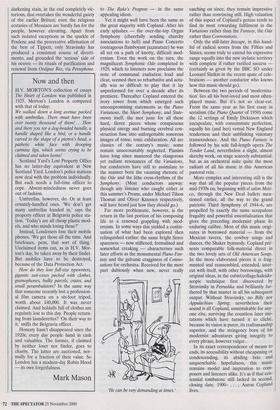Now and then
H.V. MORTON'S collection of essays The Heart of London was published in 1925. Morton's London is compared with that of today: We walked down a long avenue packed with umbrellas. There must have been over twenty thousand of them! . . . Here and there you see a dog-headed handle, a handle shaped like a bird, or a handle carved to the shape of a pierrot's head, a pathetic white face with drooping carmine lips, which seems crying to be claimed and taken home!
Scotland Yard's Lost Property Office has no latter-day equivalent at New Scotland Yard. London's police stations now deal with the problem individually. But each needs a full-time officer to cope. Absent-mindedness never goes out of fashion.
Umbrellas, however, do. Or at least ornately-handled ones. 'We don't get many umbrellas handed in,' says the property officer at Belgravia police sta- tion. l'oday's are all cheap plastic mod- els, and who minds losing those?'
Instead, Londoners lose their mobile phones. 'We get those all the time. And briefcases, pens, that sort of thing.' Unclaimed items can, as in H.V. Mor- ton's day, be taken away by their finder. But mobiles have to be destroyed, because of the Data Protection Act.
How do they lose full-size typewriters, gigantic suit-cases packed with clothes, gramophones, bulky parcels, crates, and small perambulators? In the same way that someone recently lost a profession- al film camera on a six-foot tripod, worth about £40,000. It was never claimed. And holdalls full of clothes are regularly lost to this day. People return- ing from launderettes? 'On their way to it,' sniffs the Belgravia officer.
Honesty hasn't disappeared since the 1920s; every day people hand in cash and valuables. The former, if claimed by neither loser nor finder, goes to charity. The latter are auctioned, nor- mally for a fraction of their value. So London has a modern-day Robin Hood — its own forgetfulness.
Mark Mason





























































































 Previous page
Previous page